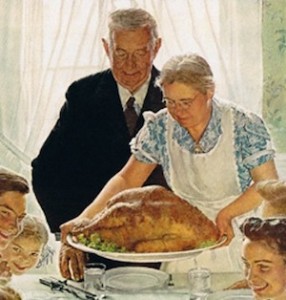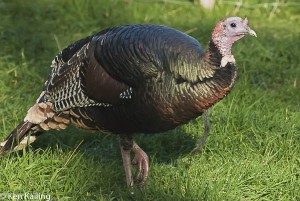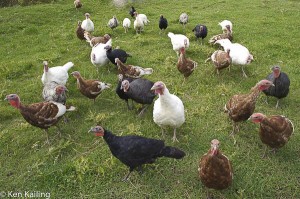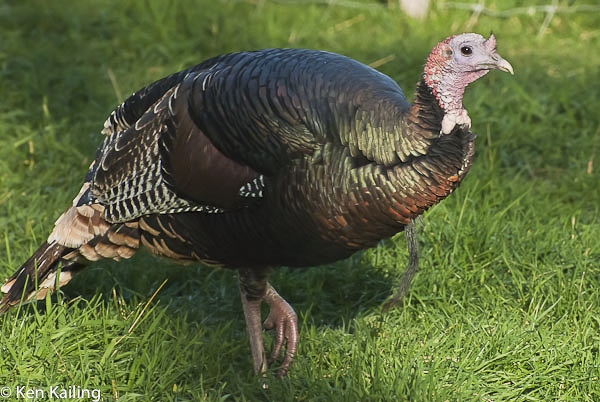It’s dawn, it’s winter, and it’s cold in the forest. The snow squeaks and crunches underfoot. Ahead in the oaks are huge shadowy figures hunched on the bare branches. Crouched vulture-like are a dozen – no, two dozen – huge feathery masses. Approach closer and one by one they launch from their perches – up to 20 pounds of body mass and feathers – extending their wings in a 5-foot span to soar overhead, feathers rustling in the branches.
Turkeys in the wild are sly, devious, and quite capable of fending for themselves in the climatic extremes of the “driftless area” of southern Wisconsin and Minnesota – the part that glaciers missed in the last ice age. In fact, across the country, wild turkeys have grown in number from about 30,000 birds in the 1930s to more than 6.5 million ranging coast to coast.
 All turkeys – wild turkeys and the broad-breasted white or the dozen or so “heritage” breeds grown domestically today – are the same species (Meleagris gallopavo). Farmers produce nearly 250 million turkeys every year of all kinds for the American table; 99.9% of those are the broad-breasted white breed sold in supermarkets across the country.
All turkeys – wild turkeys and the broad-breasted white or the dozen or so “heritage” breeds grown domestically today – are the same species (Meleagris gallopavo). Farmers produce nearly 250 million turkeys every year of all kinds for the American table; 99.9% of those are the broad-breasted white breed sold in supermarkets across the country.
Around 25,000 heritage breed turkeys are raised on small farms and sold directly to consumers or through specialty markets. If you live in Wisconsin or Minnesota, you are more likely to have a wild turkey on your dinner table than a “heritage” breed: in 2009, more than 70,000 wild turkeys were killed during the states’ spring and fall hunting seasons. (1)(2)
Broad-breasted Whites – The Turkey for the American Table
Benjamin Franklin admired the wild turkey for its boldness and ability to forage for itself. In the 230+ years since, consumers have come to admire the domestic turkey for its ability to grow fat and large breasted, fast! The broad-breasted white grows to an average of 32 pounds in just 18 weeks. So fast that the bird develops a variety of health problems including leg and joint disorders, lameness, heart disease, and weakened immune systems.(3)
Turn these birds out from their factory farms and they’d certainly die. They can’t run – in fact, they can barely walk – or fly. They depend on large quantities of high protein food and hormones to support rapid grown. And – as a final insult – even if allowed the opportunity to mate, they couldn’t reproduce.
While turkey continues to be the centerpiece of Thanksgiving dinner, prices are continuing to rise. This year, wholesale prices for conventional turkeys are up about 28% and retail prices are expected to be up 20% over 2009.
Yet, the supply is so large that retailers like Boston-area Stop & Shop will continue to donate turkeys to food banks. This year, Stop & Shop will contribute 40,000 turkeys to the Greater Boston Food Bank.(4)
Heritage Turkeys – The New American Turkey
 Consumers who want pasture-raised heritage breed turkeys are looking for birds that are well cared for, grow slowly, and have flavorful meat. Unfortunately they are expensive to produce.
Consumers who want pasture-raised heritage breed turkeys are looking for birds that are well cared for, grow slowly, and have flavorful meat. Unfortunately they are expensive to produce.
Domestic turkeys are tough animals to raise. Poults (young turkeys) are fragile birds. They don’t tolerate heat or cold very well, they start out needing a very high protein diet and, until they are about 10 weeks old, they are at risk from predators while in the field. The heritage breeds are more robust than the broad-breasted whites and, once they are large enough to fend for themselves outdoors, they grow slowly, taking 24 to 30 weeks to reach market weight.
“We laugh – rather ruefully – that young turkeys are looking for a way to die,” said Louis Sukovaty, owner of Crown S Ranch. “They get chilled, they don’t drink enough or eat enough, they drown in their water basins, they get eaten by hawks or raccoons…” It’s these kinds of challenges that make pastured turkeys costly.
At the same time, growing demand is driving up the price. Dean and Deluca – the high-end food market – offers heritage turkeys for $90 (for a 10-pound bird) to $125 (14 pounds). Also available at D&D is the D’Artagnan wild turkey – “farm-raised from the original wild breed” – for $14 per pound. That’s a whopping $168 for a 12-pound bird.(5)
Compare that to QFC, a Seattle chain of supermarkets, which this week offered 24-pound turkeys for $7 with the purchase of $25 worth of groceries.
 While pastured, free-range, antibiotic- and hormone-free, naturally raised heritage turkeys may more closely resemble the turkeys our great grandparents ate; they are being priced out of the reach of the average American.
While pastured, free-range, antibiotic- and hormone-free, naturally raised heritage turkeys may more closely resemble the turkeys our great grandparents ate; they are being priced out of the reach of the average American.
Short of partnering with a turkey hunter or raising a couple of birds in the back yard, consumers looking for alternatives are buying from farmers like Sukovaty who sell direct. Every year, Crown S Ranch raises several hundred organic turkeys, both broad-breasted whites and heritage breeds. And they are a bargain at $6 or $7 a pound.
– – – – – – – – – – – – – – – – – – – – – – – – – – – – – – – – – – –
(1) Minnesota wild turkey harvests: http://files.dnr.state.mn.us/recreation/hunting/turkey/fallturkey2009_harvest.pdf
http://files.dnr.state.mn.us/recreation/hunting/turkey/springturkey2009_harvest.pdf
(2) Wisconsin wild turkey harvest:
http://dnr.wi.gov/org/land/wildlife/hunt/turkey/harvsumm.htm
(3) Farm Sanctuary, Unnatural Breeding Techniques and Results in Modern Turkey Production, http://www.farmsanctuary.org/mediacenter/turkey_ai.html
(5) http://www.upi.com/Odd_News/2010/11/22/Turkeys-sell-for-up-to-14-a-pound/UPI-65681290447403/


The point I was trying to make is – indeed – that some people are taking advantage of the return to heritage turkeys. $4/pound is extremely reasonable for pastured, organic turkeys – $14/pound for the same turkey is approaching highway robbery.
No, we shouldn’t turn back to factory meat; no, we shouldn’t “just eat corporate turkeys.” What we should do is support the small farmer who is doing his or her best to raise a good bird and sell it at a reasonable price.
It IS unconscionable to charge $318 for a 25# turkey just because it is:
That’s pretty much the description of the pastured, organic turkeys that the farmers I have met raised this year. BTW – that is the description and price that I found on this e-commerce site: http://www.localharvest.org/range-heritage-turkey-out-of-state-2011-C6516.
The whole point is that there is a certain group of people who have discovered they can add a lot of marketing hype to the description of a turkey and charge what ever they want.
Thanks for reading and commenting!
Gail N-K
I agree with you on this one – – I’m a small scale organic farmer and i do raise some turkeys now and then – chickens every year – I’ll grow organic patured turkeys for
$4/lb any time – anyone asking for much more is playing the fad trends and engaging in lucre. Just my opinion…
I can’t figure out what the point of this article is. What are you trying to say? That we should just eat corporate turkeys full of chemicals because free range drug free turkeys cost too much? You admit turkeys are hard to raise so it would seem you understand why sustainable raised turkeys cost more, but then you go on about $175 turkeys like these farmers are horrible scam artists. Free range, antibiotic and hormone free local turkeys are $4 a lb in our town, $48 – $80 a bird. Is this article about some people taking advantage of the trend for sustainable meat and inflating prices, or a bash on the whole turn away from factory meat? Its frustratingly unclear what you are trying to say.